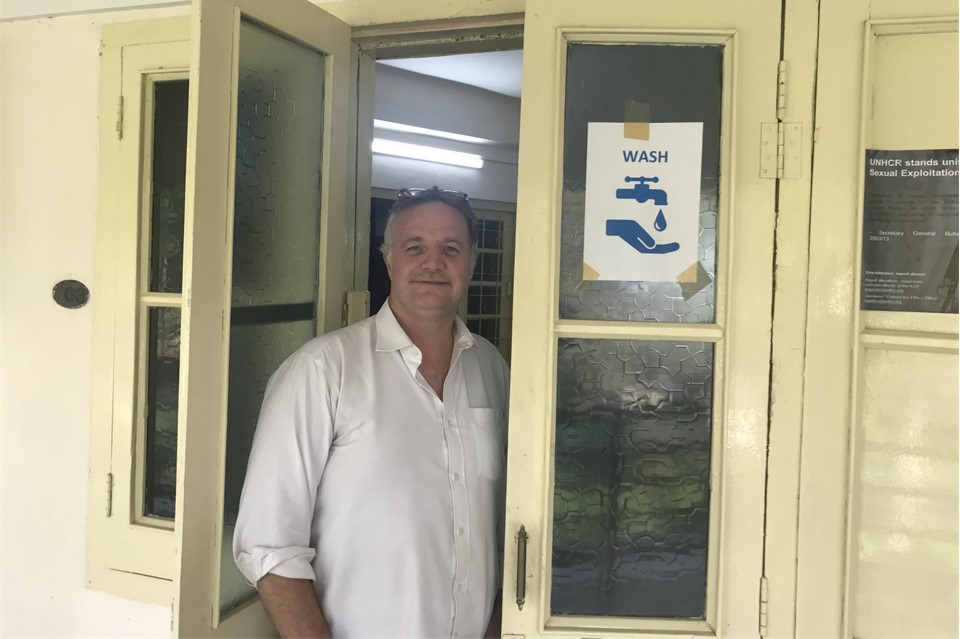Rushing experts to emergencies - Roland Schoenbauer
News
08 May 2018
Jimmy Greene - UNHCR/Firas Al-Khateeb
Rushing experts to emergencies
Roland Schönbauer, Geneva
Sometimes at UNHCR, the UN Refugee Agency, we need someone to give us a hand. In emergencies, we might need more than a pair of hands – and fast.
This is when standby partners with their staff come in. Staff like water and sanitation expert Jimmy Greene from Irish Aid who jumped on a plane in October 2017 to join UNHCR in the world’s fastest growing refugee crisis in Bangladesh – the arrival of over 670,000 stateless Rohingya from Myanmar where they escaped murder, rape and attacks on their villages. They hastily settled in overcrowded huts on steep hills - initially without a proper water or sewage system. Jimmy Greene, an Industrial Engineer originally from Dublin, helped UNHCR and partners tackle the 16-Million-question: How to give 16 million litres of fresh and clean water every day to the refugees and locals in the area near Cox’s Bazar?
Jimmy Greene’s mission was one of some 110 that UNHCR sent to emergencies in 2017 thanks to the support of a network of 18 Standby partners ranging from the Irish Government’s programme for overseas development (Irish Aid), government agencies like the Swiss Cooperation Agency SDC, non-governmental organizations including the Norwegian Refugee Council, the Danish Refugee Council and civil protection agencies such as MSB Sweden. Each Standby Partner maintains its own roster of humanitarian experts who are called upon to fill staffing needs and gaps in UN operations.
Their services cover areas of expertise for core UNHCR activities: protection, Water, Sanitation and Hygiene (WASH), shelter and field coordination as well as such as registration, information and communication technology or accommodation and infrastructure. UNHCR selects them based on their proven emergency and surge capacity, on their commitment to the refugee cause as well as to established standards and policies such as UNHCR’s revised Emergency Policy. Their work hours represented a donation by Standby partners to UNHCR worth some 8 million USD in 2017, up from 6, million USD in 2016.
Seconded to UNHCR, these experts act as team members of an emergency operation. “We value their technical expertise made available often in a matter of days or a few weeks, quicker than a fully-fledged recruitment of such specialized person power would take”, explains Eilish Hurley, Emergency Partnerships and Deployments Officer in Geneva. “Partners such as Irish Aid complement our teams”. UNHCR has its own emergency response roster whose members have committed to leave for a crisis with 72 hours’ notice. Its Division of Emergency, Security and Supply (DESS) has an additional group of Emergency Coordinators and specialists that regularly jump in for missions of two to three months to support operations in specific roles.
When Jimmy Greene, who had been on emergency mission for UNHCR to Uganda before, arrived in Cox’s Bazar, Bangladesh, several densely populated refugee settlements such as Kutupalong, the world’s largest of its kind, had sprung up on a stretch of land allocated by the government. It was initially covered with thick vegetation which was cleared soon to make room for the massive influx of new arrivals leaving it prone to landslides and flooding due to its hilly topography. The refugees had to rely on emergency latrines that were provided in the beginning and filled up quickly. While a number of organizations, too, had rushed to their relief, the water and sanitation sector (WASH) lacked both a planned infrastructure and coordination to ensure minimum standards for everyone. “Despite a number of challenges, we improved the coordination mechanisms with partners and other UN agencies”, says Jimmy Greene who helped establish proper sanitation facilities. Faced with the 16M-question, “there were many good ideas how to improve WASH services, including through a system of boreholes and by extending existing water treatment plants. We managed to harmonize the borehole standards and latrine designs with the support of the authorities”, says Greene.
With the monsoon season and its heavy rains around the corner, Jimmy Greene helped move vulnerable refugees from landslide or flood prone areas to other, safer parts of the settlements. In addition, he planned the pre-placement of emergency stocks of specific relief materials such as water purification tablets, plastic tarps, and shovels for their distribution during or after monsoon.
Meanwhile, Jimmy has returned home having completed his deployment, and is ready to be assigned to another humanitarian emergency from Irish Aid’s roster of Humanitarian experts, the Rapid Response Corps.
Additional Reporting: Firas Al-Khateeb, Cox’s Bazaar, Bangladesh
If you think that you have the skills to join the Irish Aid Rapid Responders Corps, click on http://bit.ly/RapidResponseCorps to find out more about the roles Irish Aid is looking for and how to apply to the corps.

